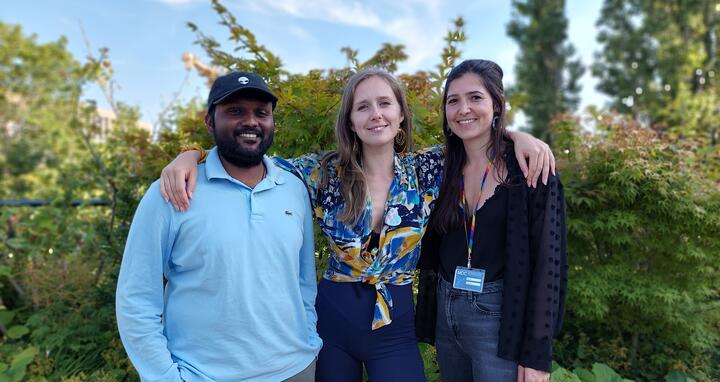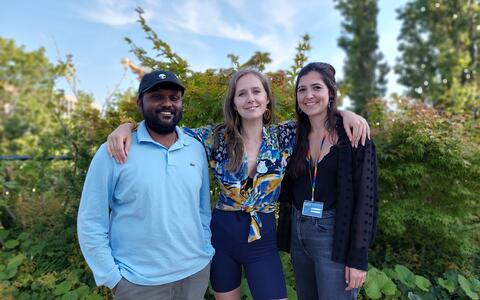Joining forces, making changes
Of the 833 scientists working (as of 2021) at the Max Delbrück Center for Molecular Medicine in the Helmholtz Association (MDC), about 380 are doctoral students. Their interests are looked after by PhD Representatives. There are currently nine. We talked to three of them about why they got involved as PhD Representatives at the MDC. Miriam Wandres has been working in Prof. Nikolaus Rajewsky’s Systems Biology of Gene Regulatory Elements Lab at the MDC’s Berlin Institute for Medical Systems Biology (BIMSB) since 2020. Somesh Sai has been at the Genomics Platform directed by Dr. Janine Altmüller, also part of BIMSB, since 2019. And Tijana Perovic is in the final year of her PhD; she has been doing research in Prof. Holger Gerhardt’s Integrative Vascular Biology Lab at Campus Buch since 2018. Miriam and Tijana were elected as PhD Representatives last year; Somesh has been one for three years.
Why did you decide to become PhD Representatives?
Tijana: I got involved so I could learn how our institute works. As a PhD Representative, you experience first-hand what matters most when writing a dissertation, what works well at the institute in this sense and what doesn’t. And you can try to improve the situation for future doctoral students.
Somesh: I became a PhD Rep for similar reasons. I wanted to understand the MDC’s processes. In order to improve them, the institute needs input, including from the students themselves. As a PhD Representative, I have a platform to express my interests and those of other students. I can give them a voice.
Miriam: If you really want to make something happen, the PhD Representatives are the best opportunity to join forces and make changes.
How does one become a PhD Rep?
Tijana: Elections are held once a year. Personally, I think that’s good. An election is like a contract. You take responsibility for the people who elected you, and that creates a stronger commitment to work for them.
Miriam: Basically, anyone who wants to get involved can. But it’s not so easy to find people to support you. It’s a lot of work, and sometimes it’s frustrating to have to explain the same things over and over again at endless meetings – things that are obvious for us PhD students but less so outside our circle.
Quality of life could be better
For example?
Miriam: We’re trying, for example, to get longer-term contracts for PhD students. Currently they run for three years. But a dissertation at the MDC takes 4.8 years on average. That means it’s necessary to negotiate a contract extension after two and a half years. Especially for students from outside the European Union, this is a stressful situation, as their residency permit is usually tied to their employment status. Therefore, we’re suggesting that contracts be issued for at least four years. As an alternative, lab directors could create dissertation projects with a realistic time frame that can be finished within three years.
What other issues are you working on?
Somesh: We work on various teams where we can each pursue what matters to us. There’s a communications and an events team, an awareness team, a network group, and the Helmholtz Juniors, a PhD student initiative within the Helmholtz Association. I’m on the communications team and am responsible for making sure that students actually receive all the information they need. In addition, I’m involved in the awareness team, as are Miriam and Tijana.
Miriam: One very important issue is improving quality of life and mental health. A survey on the N² platform shows that many PhD students struggle with symptoms of depression. N² stands for “network of networks.” It was started by Max Planck PhDnet, the Helmholtz Juniors, and the Leibniz PhD Network to a provide a common forum, including most non-university institutions, for all questions relating to earning a PhD.
The academic world is under pressure
What is especially stressful for PhD students?
Miriam: Many of us are under incredible pressure. We’ve already talked about fixed-term contracts. But there are other reasons as well. For example, it’s very hard to balance family life with pursuing a PhD. Some of us already have children, but our work hours are anything but family friendly. That needs to be taken into consideration. Parents of small children should also be able to earn a PhD.
Tijana: The academic world has changed drastically in the last 50 years. The pressure on scientists has grown enormously, both economically and with a view to publications. And then came COVID-19. The pandemic increased the pressure even more. It was especially hard on PhD students from other countries, who were unable to see their families for a long time. But every crisis also contains opportunity. Now that weaknesses in the system have been made clear, we have the chance to change things for the better. We’re currently experiencing very positive developments.
Equality – diversity – inclusion
Is there something that’s especially important to you?
Miriam: Somesh already mentioned that we’re involved in the awareness team. That’s very important to us. I’m also very committed to the issue of diversity. Our Administrative Director, Prof. Heike Graßmann, launched an EDI workshop in December. EDI stands for “equality, diversity, and inclusion.” At the workshop we generated a whole list of things we’d like to institute at the MDC. Now we meet once a month for discussions led by Dr. Michael Hinz, the MDC’s Sustainability Officer.
f.l.t.r.: Somesh Sai, Tijana Perovic and Miriam Wandres
What is your main concern?
Miriam: We want the MDC to have an EDI Officer. That person’s first job would be to examine how diverse the MDC actually is. Another role would be to act as a contact person when problems arise, and maybe also to educate MDC staff on questions of diversity. People still discriminate against others on the basis of traditional patterns of thought and stereotypes, although it’s often unconscious. This is also the case in personnel recruitment – that’s why photographs will be removed from applications in the future, to eliminate discriminating factors like age, skin color, sex, and religion.
The MDC has many international researchers. Isn’t an institution like that automatically diverse?
Miriam: What matters is that diversity is actually lived and experienced. That’s why we need to become more conscious about the issue. There are data about individual groups at the MDC, but they are incomplete and do not get analyzed. One of our other aims is to have a PhD fellowship created for underrepresented groups. In addition, we’re working for very practical things like a prayer room, unisex bathrooms, and handicapped accessible buildings. What we also need is someone to help get therapy for people suffering from psychological problems. The pandemic made it clear how hard that can be – especially for non-native speakers.
Creating more contact between Buch and Mitte
Tijana: Another topic is very close to my heart: our identity as members of the MDC. There is currently little contact between the PhD students in the individual research labs and those in the various research facilities on Campus Buch, let alone between the PhDs students working in Berlin-Buch and those working at BIMSB in Berlin-Mitte. I would like to see us meet more and get to know each other better.
What would help increase the feeling of togetherness?
Tijana: For example, I think it would be terrific if the lab directors gave regular talks about their work. There you could meet each other and learn what the other labs are actually working on – not only would that greatly expand your own horizons, but you would also have a much better sense of what’s going on at the MDC.
What successes have the PhD Representatives achieved so far?
Tijana: The PhD Representatives have already chalked up some quite remarkable achievements, including securing better pay for PhD students. Another achievement is the guidelines for dealing with bullying, discrimination, and sexual harassment, which we helped developed through our participation in the Anti-Harassment Task Force. Overall, there is a greater awareness of the concerns of PhD students than there was a few years ago. We now have quite regular meetings with the Board of Directors, where we talk in a very structured way about the issues we feel most strongly about. And the Board also takes them seriously.
Miriam: That’s a very important point: Communication has improved a lot. In the past, many things happened without any input from us, even though there are almost 400 of us at the institute. Now we are asked if we have any suggestions for change. That increases the chances of success enormously.
Thank you very much for your time.
Jana Ehrhardt-Joswig conducted the interview.






